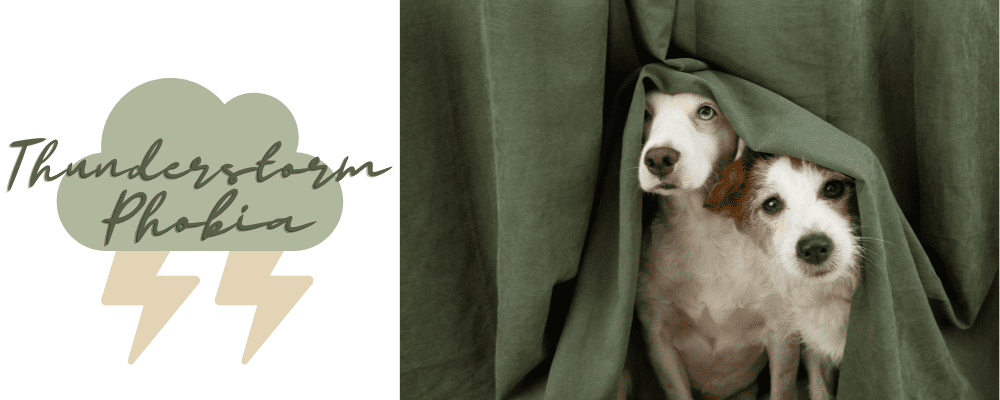Thunderstorm phobia or anxiety in dogs is a fairly common and very real problem for many dogs. Dogs with thunderstorm phobia may become extremely frantic and overwhelmed with fear during storms. Astraphobia is the technical term for this: the fear of thunder and lightning. Owners who see their dogs experiencing this fear usually feel helpless and frustrated.
Factors that may cause a dog to be fearful to thunderstorms:
- Electricity in the air may be a factor. We do not completely understand this effect.
- A dog’s keen sense of smell helps them to detect the changes in the air prior to a storm.
- Their excellent hearing lets them hear thunder very far away, long before our human ears can
- Air pressure changes may also be unsettling to some dogs.
- Family routine may change as bad weather approaches.
If your dog seems anxious, hyperactive, destructive or reclusive during storms, you are probably dealing with thunderstorm phobia. The signs are usually quite obvious, so you probably already know your dog is phobic of storms. Many dogs will pace, pant, or quietly whine. Some are clingy and seek attention. Other dogs will hide, frozen with fear. Your dog’s fearful behavior may be subtle at first but can become worse with time, eventually becoming full-blown panic attacks that are very dangerous for your dog. It is not uncommon for dogs with thunderstorm phobia to urinate and/or defecate inappropriately
Prevention and Precaution:
It is essential to reduce anxiety during the noise event to prevent worsening of the fear and to allow management and treatment options to work. More simply stated, a dog needs to be relaxed in order to learn.
- Keep your dog inside as a storm approaches and certainly during a storm.
- Be a calm owner during the noise event. Be confident, upbeat and relaxed. Dogs can pick up on negative body language.
- Reward your dog for calm confident behavior. Quiet petting is good with confident soothing praise. Do not overly baby or cuddle your dog. This may reinforce the fearful behavior.
- Let your dog find a quiet refuge – their cage, a closet, bathroom or bath tub are all good places.
- Consider a thunder shirt or thunder cape. Both work by applying gentle pressure to a dog’s chest and may diminish some of the “electricity” felt by your dog. Thundershirts are available at Animal Medical Clinic.
- Pheromone Intervention (Adaptil) – Pheromones are available in sprays or continuous room diffusers. Adaptil had a calming effect on 73% of dogs in one study.
- A variety of herbal and homeopathic products are available. For example, Shen Calmer is a Chinese herbal product used commonly for noise phobia. Zylkene is a milk-protein based supplement designed to stimulate the sensation a puppy has when it is nursing.
- More anxious dogs may benefit from anti-anxiety medications prescribed by your veterinarian.
